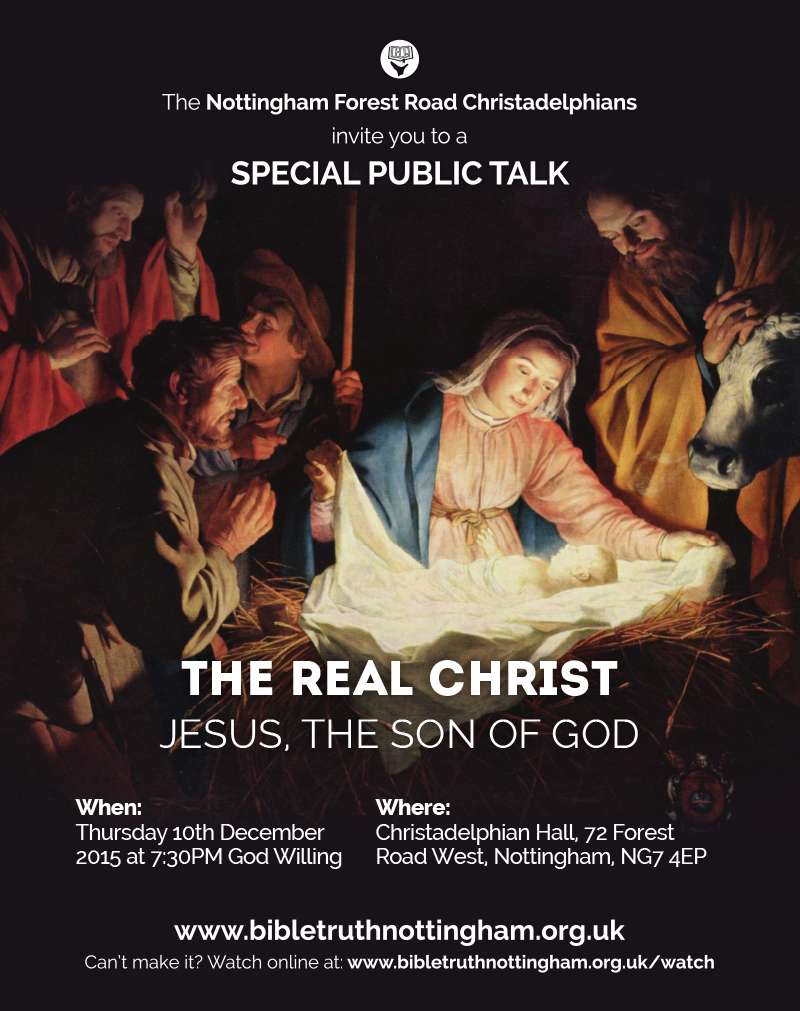
|
The Real Christ
Jesus the Son of God
|
|
Wednesday, December 09, 2015
|
www.bibleinthenews.com Audio & Print versions
|
But who was Jesus Christ and why was he so important? Depending on who you ask about this you might get different responses. The atheist might reply by saying that Jesus was nothing more than a man who taught and lived a good life. A church theologian might respond by saying that Jesus was in fact God Himself, a part of a Trinity.
Who was Jesus?
But who does the Bible say Jesus was? In Luke chapter 1 and at verses 31 and 32 we read of how the angel Gabriel comes to Mary, the mother of Jesus before Jesus was conceived. This is what the angel says to her:
“And, behold, thou shalt conceive in thy womb, and bring forth a son, and shalt call his name JESUS. He shall be great, and shall be called the Son of the Highest: and the Lord God shall give unto him the throne of his father David:”
At verse 35 we read:
“…The Holy Spirit shall come upon thee, and the power of the Highest shall overshadow thee: therefore also that holy thing which shall be born of thee shall be called the Son of God.”
This is a fulfilment of a prophecy in Isaiah 7:14
“Behold, a virgin shall conceive, and bear a son, and shall call his name Immanuel.”
Here we are reading of how, through God’s power, Mary, a virgin, would become pregnant and give birth to Jesus. He was to be the Son of God. Note: he was not God the Son as some churches teach, this phrase is never used in the Bible. Jesus is not God. He was the Son of God and as such was also to be born as a human being, inheriting human nature from his mother, Mary.
Human Nature
Human nature is an interesting topic in the scriptures. Unlike the general consensus of our humanistic society which teaches us the goodness of man, the Bible paints a very different picture of mankind.
For example:
“The heart is deceitful above all things, and desperately wicked (sick)…” Jeremiah 17:9
“For I know that in me (that is, in my flesh,) dwelleth no good thing: for to will is present with me; but how to perform that which is good I find not.” Romans 7:18
“For out of the heart proceed evil thoughts, murders, adulteries, fornications, thefts, false witness, blasphemies: These are the things which defile a man” Matthew 15:19-20
Human nature has a bias towards sin. Towards doing that which is against God’s law.
The process of sin is explained to us in James:
“But every man is tempted, when he is drawn away of his own lust, and enticed. Then when lust hath conceived, it bringeth forth sin: and sin, when it is finished, bringeth forth death.” James 1:14-15
So man is drawn away from the things of God by his own lust that comes naturally to him. When he gives in to that lust he sins and sin brings death.
As we read in Romans 6:23 “For the wages of sin is death”.
Jesus the saviour of mankind
So what does this all have to do with Jesus?
Well the Bible tells us that this “state” of sin and the nature we have which tempts us to sin is something which is inherited from generation to generation. This goes right back to the first man and woman, Adam and Eve and the fist sin which was committed in the garden of Eden.
For example we read in Romans 5:
“Wherefore, as by one man sin entered into the world, and death by sin; and so death passed upon all men, for that all have sinned:”
In the garden of Eden, both Adam and Eve both sinned. At that time that was all mankind. Because of this death passed or spread to all of their descendants as a consequence. A breach had occurred in the relationship between God and man. Generation after generation inherited two things from Adam - mortality and the temptation to sin.
Jesus Christ, because he was born of Mary as a human being also inherited this state. We read in Hebrews:
“Forasmuch then as the children are partakers of flesh and blood, he also himself likewise took part of the same; that through death he might destroy him that had the power of death, that is, the devil;” Hebrews 2:14
When we read of the devil here it is not speaking of an immortal fallen angel monster. The word “diabolos” simply means “false accuser” or “liar”. Here we have a literacy device called “personification”. The thing which has the power of death is human nature, which leads men to sin. However here it is given a personality “him that had the power of death”.
Jesus destroyed the devil
How did Jesus destroy this power? By overcoming, through God’s spirit power, the inclinations of his human nature. He was the only human being to live to not sin. As it says in Peter, Jesus “did no sin, neither was guile found in his mouth:” (2 Peter 2:22).
We are told in Hebrews though he was tempted to sin:
“For we have not an high priest which cannot be touched with the feeling of our infirmities; but was in all points tempted like as we are, yet without sin.” Hebrews 4:15
In order to do no sin Jesus had to completely obey his Father. This meant following through with the most painful and excruciating death one could imagine, that of crucifixion. The question to ask here is “why would a loving God require His son to die?”.
The answer is in Romans 8:3:
“…God sending his own Son in the likeness of sinful flesh, and for sin (marg. a sin offering), condemned sin in the flesh:”
Jesus’ death meant something. It had sacrificial principles. He was to condemn sin in his flesh. He was to overcome. This was God’s way of opening up a way of salvation and reversing the effects of Adams fall. Only one who possessed the inclination to sin and yet overcome it’s temptations completely could be a perfect sacrifice to take away sin.
Because Jesus did not sin we read:
“Jesus of Nazareth, a man approved of God among you… Whom God hath raised up, having loosed the pains of death: because it was not possible that he should be holden of it.” Acts 2:22-24
God raised him from the dead and removed his mortal and sin prone human nature.
In God’s love and mercy we read in the Bible of how, on account of associating oneself with Christ’s sacrifice through baptism, God is willing to forgive our sins, and also, if we are found worthy when Christ returns, to remove our human nature with it’s temptations and grant us eternal life in God’s Kingdom.
In Romans 3 we read of Christ’s sacrificial work. He was “set forth to be a propitiation (or mercy seat / meeting place) through faith in his blood”. This act declared God’s “righteousness for the remission of sins that are past, through the forbearance of God” Romans 3:24-26.
The sacrifice of Christ showed how worthless human nature is. God was righteous, or right, for Christ to be required to die because he bore the source of sin in his flesh. He was also right to raise him from the dead because he not once gave into that nature.
The true hope of the Bible believer
The wonder of the Bible is the message that if we believe in the meaning of Christ’s death and have faith that the shed blood of Christ declares God’s right-ness, we can have a hope of eternal life in the future on account of that. We declare that faith in baptism and a life patterned on Christ. As we read in Philipeans 3:20-21:
“For our conversation (way of life) is in heaven; from whence also we look for the Saviour, the Lord Jesus Christ: Who shall change our vile body, that it may be fashioned like unto his glorious body, according to the working whereby he is able even to subdue all thijgs unto himself.”
What a wonderful hope the Bible therefore proclaims. That Jesus Christ can be our representative. That on account of this we can have the hope of salvation. Such a different hope to the one published by mainstream Christianity around with it’s ideas of the immortal soul, floating off into heaven upon death because of a substitutionary sacrifice of Jesus.

Your invitation to a special Bible talk
The Real Christ - Jesus the son of God
If this topic interests you and you would like to know more about what the Bible teaches on this subject, we thought you might be interested in a special public talk the Nottingham Christadelphians are holding this Thursday at 7:30PM UK time.
With all the publicity about Christmas, we thought it would be a great time to hold this special talk about Jesus. We want to take the time with you to open up the Bible and discover the real Jesus, right from the pages of Scripture.
In this talk we will seek to answer some of the big questions about Jesus touched on in this weeks Bible in the news. Who was he? Was he part of a Trinity? What was his mission and significance of his birth, life and death?
Using only the Bible we hope to explain these questions in this talk. You might be surprised by some of the answers - especially as we believe the distinctive gospel message preached by the early believers in Jesus has since become distorted and mainstream Christianity no longer reflects most of the original teachings we find in the Bible.
If you can’t make it to Nottingham on Thursday night then you can always tune in at www.bibletruthnottingham.co.uk/watch
This has been Matt Davies joining you for another Bible in the News. Come back again next week God Willing.